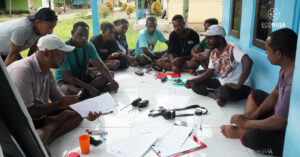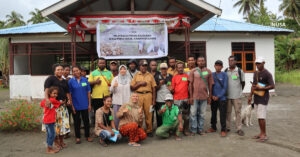
An Indonesian Navy diver from Ternate Navy base participating in the Beach Clean Up activity found a bundle of paper dated 1997/1998 in a good condition under water. It means that the waste has been buried for 22 years in Ternate sea. The paper that should have decayed was in a good condition which was clearly read notes as they were packed in thin plastic. Plastic takes years and even thousands of years to be degradable. The finding has evidently showed the truth that the currently mentioned plastic monster terror really put Indonesian ocean at risk.
Sadly, waste that was every so often suggested to come to the final end on the surrounding environment actually has polluted the ocean at thousands of kilometers away. The team of Ternate Beach Clean Up attempted to trace the old waste found on the spot. In fact, the bundle of paper on plastic was allegedly coming from Surabaya, a city located 2,800 kilometers from Ternate.
Read also: Youngsters in Ternate Fighting against Sea Debris
Upon realizing the threat of plastics, Khairun Ternate University supported by EcoNusa Foundation held a Beach Clean Up activity at Nukila and Falajawa beaches on 28 October 2020. It aimed to remind the community of the large number of plastic monsters haunting the Ternate sea. With the support of Ternate-based Indonesian Navy, Military District Command 1501 Ternate, Sea and Air Police Ternate and various community elements, 350 participants could collect more than 8.4 tons of plastic waste from beaches and seabed.
“In Ternate alone, the community produces 70,000-80,000 tons of daily garbage of which 20,000 tons are of plastics,” said Yus Karim, the acting Head of Ternate’s Environment Office.
Waste produced from single-use plastic from the community on the land flows through the rivers to the sea and move farther to the open sea. The end of the waste travel will come back to human as the end. On the sea, plastic will not only trap the sea fauna but also become their diet. The biota with plastic consumption will eventually be back in the form of seafood with microplastic content on their meat and its jeopardizing effect to human health.
“I am contented that the academician, particularly young students, can take parts actively for our unity and environmental protection, particularly the sea of Ternate City,” said Syawal Abdulajid, the Deputy Rector on Cooperation, Students and Alumni of Khairun Ternate University.
In addition to Ternate, the series of Beach Clean Up in commemoration of Youth Pledge Day were also conducted in the other cities, namely Malang, Surabaya, Yapen, Manokwari and Ambon in end of October 2020.
Editor: V.A Wulandani & Leo Wahyudi









